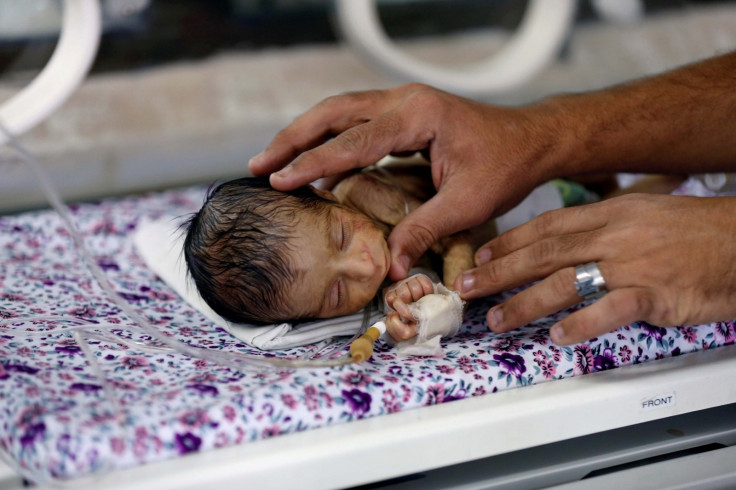UK grant to support Yemen's nutrition, sexual and reproductive health sector
The number of reported gender-based violence incidents increased by 36 per cent, amid the nine-year conflict in Yemen. Today, the food crisis has contributed to 500,000 children suffering from severe acute malnutrition.

A new humanitarian programme has been created by the UK that will see people in Yemen provided with access to water hygiene, nutrition, primary health care and sexual health services.
The new programme will cost £160 million and will see an increase in the protection of Yemeni women, children and people in conflict by preventing gender-based violence.
Although the full-scale conflict has not resumed following the UN-brokered truce in 2022, the current situation in Yemen remains one of the world's largest humanitarian crises. Two-thirds of Yemen's population has been identified by the UN as in need of humanitarian assistance in 2023.
Yemen has witnessed a nine-year conflict between Yemeni government forces and the Houthi group – an Islamist political and armed organisation. Due to the conflict and an extreme shortage of resources, a huge 21.6 million people in Yemen seeking humanitarian support.
Ali al-Ameri, 45 dad of seven children from Wisab, used to be a farmer & an wage worker. The US backed Saudi war on Yemen has displaced him for 7 years now. He used to get aid but not any longer. "We live on leftovers right now," said al-Ameri from his tent on the edge of capital pic.twitter.com/FX8jGFEQfQ
— 🅱🅴🅽_🅽🅾🅼🅰🅽 (@Ben_Noman_H) July 29, 2023
The full-scale war has caused a mass displacement of more than 4.5 million people in Yemen. Around three out of four of the 4.5 displaced people are women and children.
Foreign Secretary James Cleverly revealed: "The conflict in Yemen continues to cause pain and suffering for millions of ordinary Yemenis, with women and children particularly paying a heavy price."
Although reporting domestic violence incidents is highly discouraged in Yemen, data shows that the number of reported gender-based violence incidents increased by 36 per cent, amid the nine-year conflict.
In 2023, nearly two-thirds of young girls in Yemen are forced into arranged marriages before the age of 18. In parts of northern Yemen, women and girls are no longer able to work independently due to the mahram system.
In 2021, only six per cent of the workforce in Yemen was made up of women.
The mahram system was implemented by the Houthi group, which bans women from travelling without a male guardian or the written approval of a male guardian.
A Yemeni mother told reporters that while travelling alone with her children "we were stopped at a checkpoint by Huthi forces. They detained us, with no food and water during [and] under very hot weather. We begged them to let us pass but they refused. They insulted us and threatened us with rape. We panicked and started crying... when they were done with us, they left us on the street at night in a secluded and isolated area... We were afraid, and the children terrified".
Mothers and their babies in a malnutrition ward in Taiz, Yemen. Many of the children here come from rural Mocha, once famous for exporting coffee, now increasingly a place of hunger. pic.twitter.com/KbPo1ApyiW
— wietske burema (@wburema) July 26, 2023
The current famine crisis in Yemen has also left 1.3 million pregnant and nursing mothers are acutely malnourished. It has been reported that every two hours, one Yemeni mother dies in childbirth from preventative causes.
According to UNICEF, only 10 per cent of children under six months are exclusively breastfed in Yemen.
53 per cent of the malnourished mothers, who are unable to produce breast milk, are now relying on infant formula. However, due to an extreme lack of supplies, some parents are illiterate or unable to financially afford infant formula. Instead, they are forced to replace milk with a homemade solution of sugar and unsanitary water.
Magid al-Gunaid, Yemen's Deputy Minister for Primary Healthcare, stated: "Unfortunately, we are one of the less advanced countries in terms of breastfeeding in the region."
In Yemen, 2.2 million children are acutely malnourished, and more than a staggering and more than a staggering 500,000 children are suffering from severe acute malnourishment.
The four-year programme will "look to reduce deaths and disease among women and children by providing nutrition, improving access to water and sexual and reproductive health services. The UK funding will aim to deliver crucial support to over one million vulnerable Yemeni women and children annually", according to the Foreign Office.
© Copyright IBTimes 2025. All rights reserved.






















